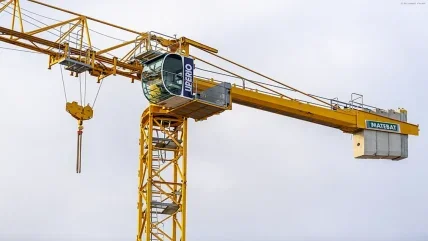
Hoist manufacturer Shepard Niles Inc nearly made it to its 125th anniversary last year. The company, famous for its heavy-duty hoists and winches, went bankrupt in January 2002. Three months later, it went under the hammer and sold on the auction block to KCI Konecranes USA.
Since then, the division of Konecranes trading as Shepard Niles – to be precise – has made a comeback. The firm now has 15 employees, and expects a turnover of $5m this year, says Bob Trader, district manager. “We think we’ve hit our low.” Adds colleague Penny Mapes, regional administrator: “Now we’re in growth mode.”
The new operation is a shadow of its former self. At its height in the 1970s and 1980s, the upstate New York company had 650 employees, a line of monorail cranes bought during the breakup of Cleveland Crane & Engineering Company, crane builder Bedford Crane, and a national network of salespeople.
Later owners hived off manufacturing plants and product lines, and in the late 90s the company cut back its sales staff and came to rely on non-exclusive dealers, which cut income. The fall in the materials handling industry in the late 90s hurt, and the company had a business loan called in (even though it was making the payments, Mapes says). When the then-owner, Marsha Underwood, had a minor heart attack, she decided to sell. Shepard Niles Inc was auctioned on 5 March 2002, and was formally closed later in the month.
As part of the Konecranes take-over, the monorail product was sold to its neighbour up the road, intelligent assist devices vendor Gorbel. Konecranes also sold off the company’s machine shop, the welding area, and other assets, and hand-picked the staff that would run the new business.
What the new Shepard Niles has, apart from the name, is filing cabinets full of all the old company’s records. “We have all the old patterns, drawings and bills of materials,” Mapes says. The company discovered there were 135,000 Shepard Niles hoists out in the field, still in operation.
“The original intention was to buy the Shepard Niles name and design and simply sell repair parts. We have done that, and are in a kind of niche market,” Trader says. “It’s taken a year to get together some vendors who can weld, and other suppliers.” The company now buys parts from other manufacturers, who are all based in the US, he added.
“All of the parts bought in are made to our drawings and inspected by our people,” Mapes says. Much of the company’s work now is in assembly. “At this point, we limit our actual manufacturing to brake coils and cable assemblies. We glue up brake linings and assemble limit switches and hoists and collector assemblies, brakes and load block assemblies, and so on,” Trader says.
But the company has found success in other quarters as well. Last year, the company expanded into repairing Shepard Niles hoists and other products. “We can rebuild anything out in the field. If you have a unit not performing, leaking oil or making noises, we can bring it in, tear it down, and get it back into shape,” Trader says. It has since rebuilt seven hoists.
And it has begun selling new hoists as well. “We ship the whole shooting match, from half a ton to 50 tons, we’ll make it,” Trader says, adding that it does not make cranes and forwards requests for cranes would be forwarded to the Houston, Texas main US Konecranes factory. The company sold seven tk hoists last year, and is working on one at the moment.
“We convinced Konecranes that we had a niche here, and that there are products in demand,” Mapes says. “It has taken us another full year to finally get them to accept this.” Though she adds that Shepard Niles has benefitted from the new owners’ feedback and support. Last year the company had a $200,000 renovation of its facility, including a new web site.
In March it signed a sales distribution agreement with R&M Materials Handling, another Konecranes-owned franchise, to sell hoists through its dealers in North America.
“We wanted to distance ourselves from the Konecranes brand. Konecranes hoists are very efficient, but they don’t have a mechanical load brake, primarily. A Shepard Niles hoist [which does have one] is a battleship in comparison,” he says. “We chose R&M because although it’s part of Konecranes, in its selling of a lot of products it has tried to distance itself from the products made in Finland.” The company also sells direct.






